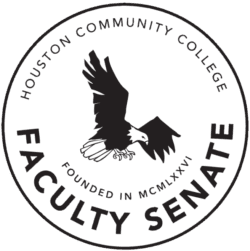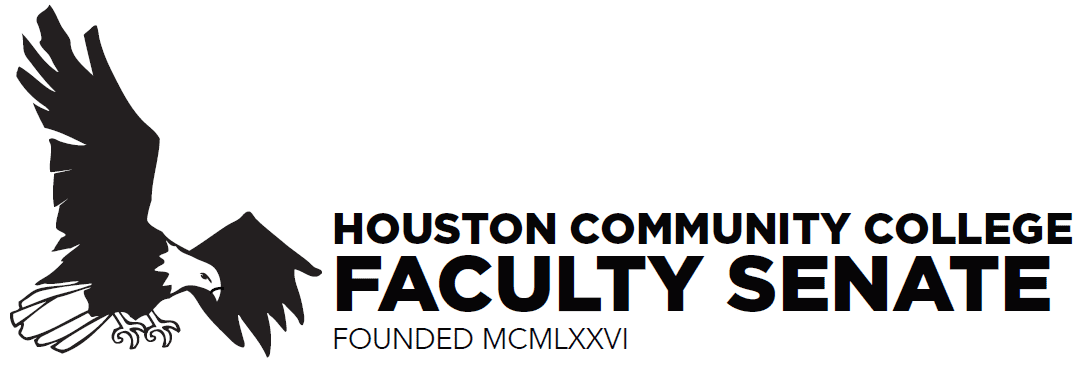Good afternoon, Chancellor, Honorable Trustees, colleagues, ladies and gentleman.
On behalf of the entire Senate, I would like to express our thanks to Trustee Loredo, Trustee Glaser, Trustee Oliver, and Trustee Evans-Shabazz for battling the rodeo traffic and stopping by our Annual Faculty Conference which was held in early March. Further, we would like to thank Chancellor Maldonado for his appearance and his words of support, as well as to Senior Vice Chancellor Zamora and Vice Chancellor Ewen for their attendance. About 300 faculty descended upon the DoubleTree in downtown Houston on that Saturday to participate in the conference, which successfully showcased our faculty’s expertise and our commitment to each other as well as our students. Richard Moore, Executive Director of Texas Community College Teachers Association presented legislative updates and the associations’ lobbying efforts, and gave an overview of the associations’ initiatives (such as Pathways, dual credit, adjunct issues). Dr. Paul Handstadt, our keynote speaker, spoke brilliantly to us about “Creating Wicked Students: Engaging Pedagogies that Improve Student Authority.” I would especially like to thank Linda Comte, Debra Schulz, and
Melinda Payne for leading the steering committee with relentless energy, patience, and enthusiasm. It’s no easy job to wrangle paperwork, contracts, bags of giveaways, vendors, publishers, and faculty to produce and host this excellent professional development event. Once again, I would like to underscore our deep and sincere appreciation to Senior Vice Chancellor Teri Zamora for creating a sustainable budget for this annual event.
March also saw our second of this semester’s Pathways Institutes for instructional and student services leaders. This institute offered an opportunity for instructional and student services folks to work together on program mapping and on investigating appropriately robust technology which would support our collective efforts. One of the best moments of this institute involved us working in small teams to unpack various program maps. The beauty of this exercise was the way it framed our experiences from the perspective of students—new to higher education and often unfamiliar with its machinations—and, for faculty, from the perspective of advisors who must often assist students with information about programs with which they are unfamiliar. The Institute demonstrated, once again, how vital it is for Instructional Services and Student Services to collaborate and work in tandem to build and provide the ultimate student experience.
During these last two months, faculty have been hard at work in and out of the classroom. The Communications department hosted their second annual speech tournament; the Reading Cultures Series concluded its programing and are in the process of assessing student work; the REEL Film and Speaker Series has concluded its Spring events, and the ESOL/INRW/English Summit will be held tomorrow. These are just a sample of the many co-curricular and professional development activities which faculty host and support. Some faculty were able to attend the Transformation Tours and appreciated the opportunity to be updated by the leadership team. Thank you, Chancellor, Dr. Beatty, Dr. Brewer, and Dr. Carter for visiting many of our locations and fielding the good, thoughtful questions of faculty and staff, for we all value transparency and those key opportunities for dialogue and interaction.
I would like to take a moment to update you on the activities of the Faculty Senate particularly: first, the Faculty Senate would like to thank Dr. Siddiqi for his visit with the senators located primarily at the Central campus. They sincerely appreciated his open format and his candor and thoughtfulness as he answered their questions and noted their suggestions. Second, we would like to thank David Cross, Director of EEO/Compliance, for visiting the full senate to discuss important aspects of Title IX. Third, I am proud to announce that the Faculty Senate has voted to convene a new, standing committee: Standing Committee for Diversity and Inclusion. This standing committee will advise Administration regarding issues of diversity, equal opportunity, and inclusion and facilitate programs and services that meet the changing needs of faculty members and instruction in a diverse community. If, as I’ve intimated before, “the key aspect of shared governance is a responsibility to share in problem solving, “ this committee stands ready to cooperate with other institutional entities to deliver on the promise of our Imagine 2019 Strategic Plan, which highlights diversity and inclusion, and to support all of our students. Fourth, the Faculty Senate is holding its first round of elections for next year’s senators. In the first round, we elect those senators designated by specific programs. By the time we meet next month, we will have identified next year’s senators.
As we race to the end of April, faculty are frantically preparing for end-of-the-semester projects, final exams, graduation ceremonies, and grade turn-in. If you see us and we seem frazzled, harried, and distracted, just give us wide berth and throw some chocolate in our general direction. We will be back to our “normal” selves sometime in the middle of May. Thank you.

